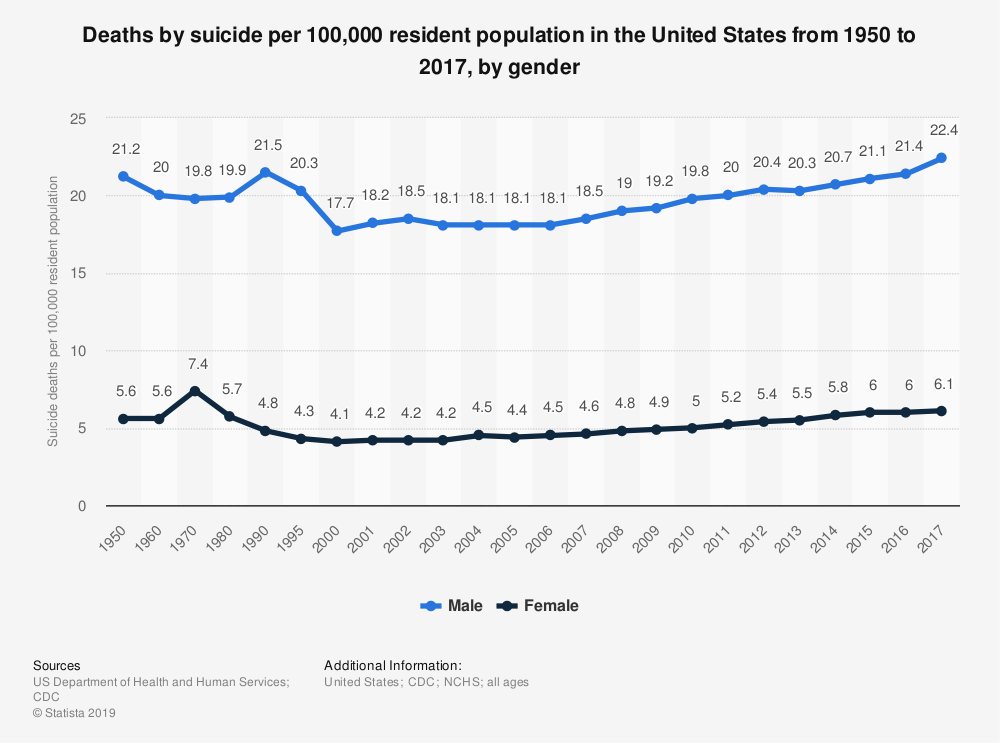Malek Sidani, Opinions Editor
@mmscourant
It’s no secret that there is a mental health crisis occurring in America. In 2018, there were 1.4 million suicide attempts, 48,344 of which were succesful. According to the American Foundation for Suicide Prevention, suicide is, in fact, the 10th leading cause of death in the US. Why has depression, suicide, and mental health overall become such a prevelant issue? It’s hard to attribute such a wide-scale problem to a single cause, but one of the more worrying factors is the stigma around getting help.
High school psychiatrist Maria Calcagni says that it can be hard to seek help because “It’s hard to admit you have a problem. In our society there’s a lot of expectation to be perfect, and no one wants to say that they can’t overcome something.” This societal pressure exists regardless of who you are. However, a worrying trend shows that when faced with depression, men often seclude themselves rather than reach out for help.
This behavior has led to a gap in statistics. For example, while women are twice as likely to be diagnosed with depression, men are over three times as likely to commit suicide. This means that a lot of men who have depression simply aren’t getting the help they need. Ms. Calcagni said, “What I’ve noticed is that girls often express their emotions to friends, family, or professional help, while men often turn into themselves.”
One may, at first, link this gap to how men and women handle depression differently. However, an anonymous male student who has been diagnosed with depression said,“I don’t think it’s easier for any gender when it comes down to the actual effect it has. However, I think that women find it easier to reach out in a time of crisis whereas men take it upon themselves to deal with it. That could mean suppressing the feelings or attempting to make peace with it.” And, Ms. Calcagni said, “I don’t think boys and girls have many different experiences. Depression is usually caused by stuff like expectations, pressure, or family issues, which both boys and girls can go through.” This means depression itself isn’t inherently worse for men or women, it’s just how they deal with it.
This brings us to the why. Why do men feel the need to bottle their emotions and hide what they are dealing with? And why are women more prone to seeking help? The answer to both is social norms. When asked about why men often seclude themselves instead of opening up, the anonymous male student I interviewed ”It’s seldom spoken about between men as it can be viewed as a weakness or even perceived as a fake-illness by some people. I wouldn’t say that it is any easier for women to speak about, but I would say they are more open about it.”
Now as for why women feel the need to open up, the truth surrounding this issue is surprising. An anonymous female student who has been diagnosed with depression said, “I think it’s difficult for both genders to obviously seek help. But for women, in general, I think girls are often expected to be more outgoing or talkative or bubbly. This may not be a universal experience but at least for me I have felt like I have had to ignore how I was actually feeling for the sake of people around me not feeling bad.” You may think that only good could come of such an expectation, but the reality is that it can be just as harmful.
These pressures, expectations, and stigmas only serve to worsen the mental health crisis in our country. The sooner we can rid ourselves of these ridiculous standards we hold both women and men to, the sooner we can solve the problem.
If you are experiencing depression or suicidal thoughts, do not be afraid to reach out. If you feel uncomfortable seeking professional help, it is encouraged that you begin by opening up to friends or family about your issues. However, there is no substitute for professional help. Keep in mind that NCHS has resources you can use. If you do want a therapist, you have both your counselor and the school’s psychiatrists available for guidance, just one email away. If you’re in imminent danger of harming yourself, the National Suicide Prevention Hotline is 800-273-8255. If you know someone going through depression or suicidal thoughts, be sure to advise them to seek help as well.




